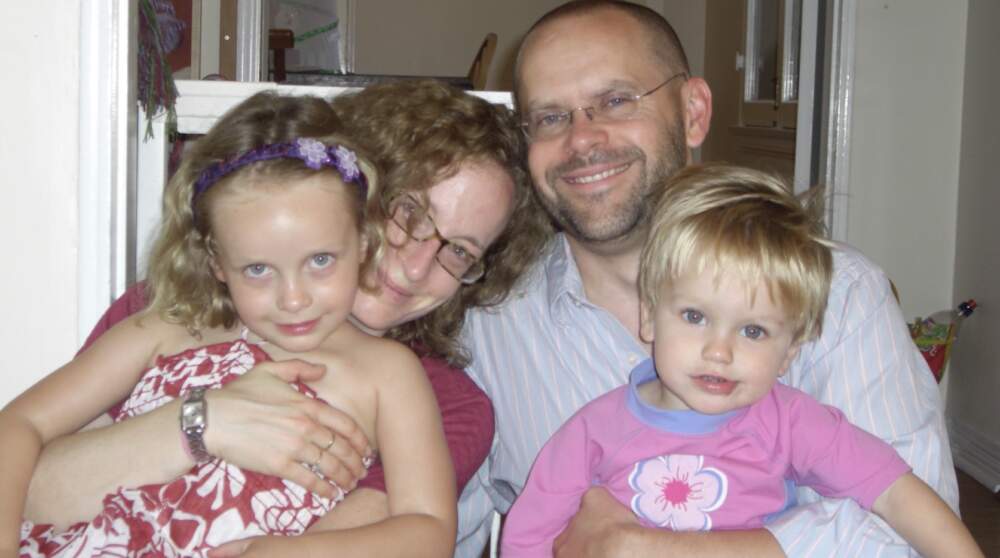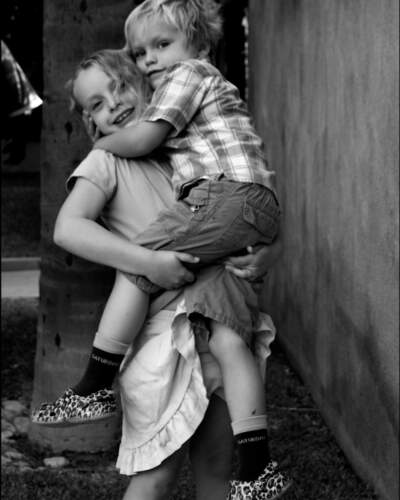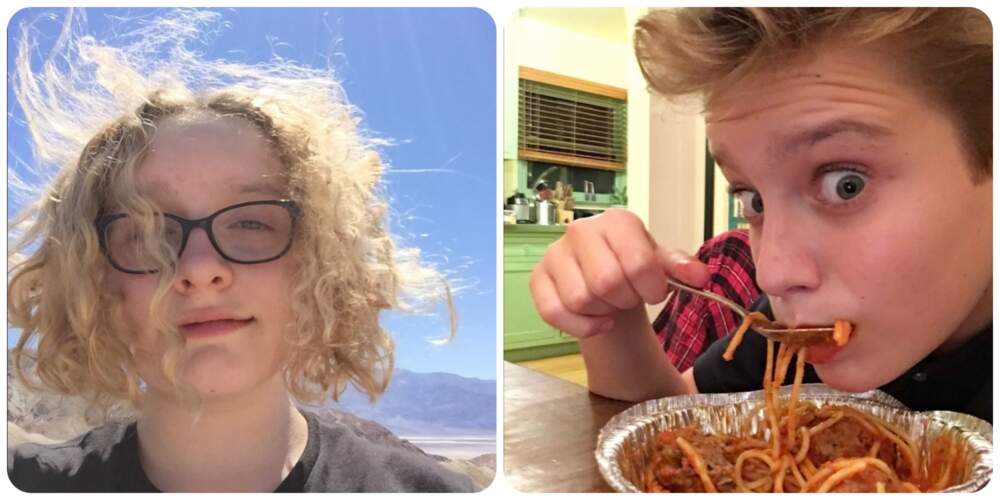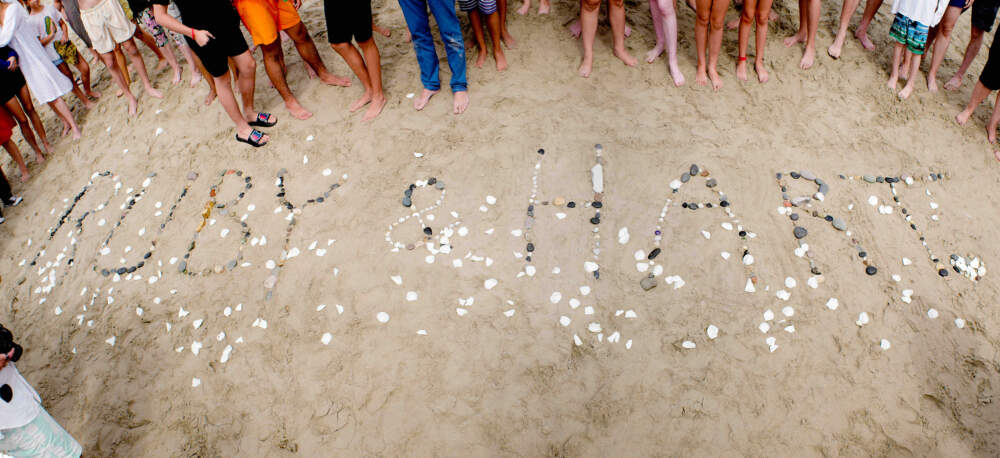Advertisement
Commentary
We spelled my children’s names in the sand

I taught my children, Ruby and Hart, how to swim in the ocean. I showed them how to float over the budding waves, and to dive deep down under the crashing ones. We clutched at the sandy bottom as the water roiled above us. While other families stayed in the shallows, I taught my children how to swim out past the breakers, where we could float in the quiet calm of the deeper waters. We would look back at the crowded beach and marvel that we had the whole ocean to ourselves — or that it at least felt that way. And then my daughter Ruby would sneakily dive down deep, hold her breath for an incredibly long time and suddenly grab my wife’s ankle, making Gail shriek in surprise. Because Ruby loved a good scare.
Every year for my birthday I would invite our adult friends, and the kids’ friends, to Santa Monica Beach for my “birthday beach bash.” In mid-September, at the tail end of summer, the Pacific Ocean is at its warmest. Many friends would marvel that my birthday party was the first and last time that year that they had been to the beach. And my family would smile smugly because we had been to the beach many times that summer (and every summer). Because swimming in the ocean is the best. I loved my beach birthdays, I loved seeing all my friends and catching up. But my favorite part was always the moment when Gail, Ruby, Hart and I quietly slipped away to swim out past the breakers — just the four of us. A family of dolphins.

And then, in June 2019, our car was struck by a drunk and high driver going 90 miles an hour and, in an instant, Ruby and Hart were killed. And my life was destroyed. Gail and I struggled in our new terrible reality. We lived in a place of disbelief. We buried our children and yet didn’t quite believe any of it was real.
I remember one day Gail was checking her phone and suddenly excitedly yelled, “Oh Colin, look at this!” and I thought, “Oh my god. She just found out that Ruby and Hart were somehow not dead after all!” My heart flipped. And then immediately crashed back down into that awful aching and yearning that was my new normal. That moment of impossible hope hurt so bad that it was hard to breathe. It turned out Gail had received a kind text message a friend had written about Ruby and Hart. In those early days of grief, I felt untethered to life. I didn’t want to live without Ruby and Hart, but I didn’t want to die either. I was adrift and disconnected. Lost.
Almost exactly three months after the car crash, I was turning 50. It was time to send out invitations to my annual birthday beach bash. But now there was nothing to celebrate. Ruby and Hart’s deaths had rendered the past 50 years of my life meaningless. And my future stretched out in front of me like a wasteland of despair and pain. How was I going to get through my birthday? How could I possibly celebrate?
Before Ruby and Hart died, I used to think mourners should be left alone so they could feel sad, and then — once they got most of the sadness out — they could rejoin society, healed and back to normal. But I have since learned that grieving is best practiced as a communal activity. I am not Jewish, but Gail is, and we raised Ruby and Hart as Jews. When it came time to grieve them, I leaned heavily on the Jewish rituals of mourning. These rituals taught me how valuable and helpful — indeed how necessary — it is to be surrounded by friends and family as you grieve.
Advertisement

So, instead of spending my birthday in bed, immobilized by grief, I sent out those invitations. Only that year it wouldn’t be a birthday party, it would be a memorial gathering to honor Ruby and Hart. I asked the guests to bring a special rock so that together we could spell out Ruby and Hart’s names in the sand. In the Jewish tradition, when you visit a grave you leave a rock on top of the headstone. It’s a physical gesture of love and remembrance. A rock is a solid symbol of love that endures. But I intended to spell out their names in the sand and let the ocean wash the rocks away. It would be a beautiful but brief offering of love. One that acknowledged the pain of having to say goodbye.
Friends and family worried about me throwing this party. How would I feel seeing all of Ruby and Hart’s friends, teenagers who got to keep living their lives while my kids did not? How would I feel surrounded by intact families when mine was shattered? But three months into grief I had already learned that to grieve and be in life meant that I was continually forced to grapple with pain. There is no avoiding it. There is no protection from it. There is no way to lessen the pain of loss. Sure, I was overwhelmed with feelings, and, yes, I cried on the beach that day, but so what? I cried every day. Being surrounded by people who also loved and missed Ruby and Hart helped me get through that long day of aching.
When it came time to spell Ruby and Hart’s names in the sand, people asked me where they should place their rocks. But in that moment, I didn’t want to direct them. I just let it happen. Somehow, we all silently, collectively decided how big each letter should be. And it wound up being spaced out perfectly. There was something magical and meaningful to having everyone choose where to place their rock. It made us all an integral part of the ritual. We stared down at my children’s names. We held hands and we cried.

And then we all, some 120 people, shouted “Ruby and Hart” at the top of our lungs and raced out into the waves. Most of the crowd stayed in the surf. But Gail and I swam out past the breakers, just the two of us. And we wept. Eventually two friends joined us. And then together we floated for a while in the calm of the deep ocean. It wasn’t good, but we were doing the best we could.
It’s my birthday again this month. The fourth since Ruby and Hart were killed. I just sent out the invitations for another beach memorial. I look forward to the love amidst the pain.
